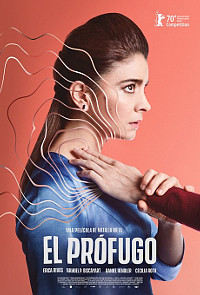| SHADOWS ON THE WALL | REVIEWS | NEWS | FESTIVAL | AWARDS | Q&A | ABOUT | TALKBACK | |||||||||||||
 Shadows off the beaten path Shadows off the beaten pathIndies, foreign, docs and shorts...
On this page:
DAYS |
GENUS, PAN |
THE INTRUDER
| |||||||||||||
| See also: SHADOWS FILM FESTIVAL | Last update 15.Oct.20 | |||||||||||||
|
Days Review by Rich Cline | 
| |||||||||||||
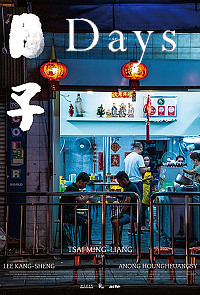 dir-scr Tsai Ming-liang; prd Claude Wang with Lee Kang-sheng, Anong Houngheuangsy release Tai Jul.20 tff, US Sep.20 nyff, UK Oct.20 lff 20/Taiwan 2h07 BERLIN FILM FEST  Is it streaming? |
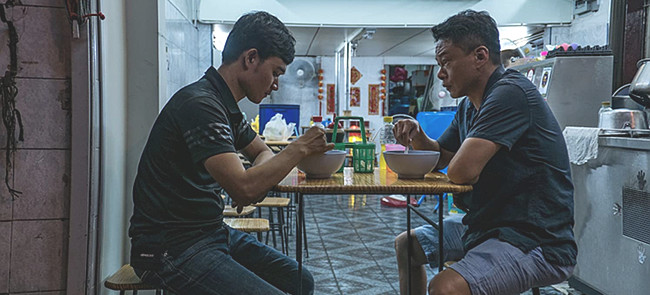 Opening with long static shots of a man staring at the rain then sleeping in a bath, there's a sense that veteran filmmaker Tsai Ming-liang is indulging in cinematic imagery, with movement only in the faintest ripples. This style continues throughout this essentially wordless film, but both motion and a narrative emerge from the stillness. This is a gloriously filmed meditation on human connection, but it does demand patience. In Taipei, the middle-aged Kang (Lee) lives on his own in a large house on a hill. Experiencing chronic neck pain, he often visits a doctor's office to endure rather outrageous treatment. Meanwhile in Bangkok, much younger Non (Houngheuangsy) lives in a small apartment, washing ingredients for dinner in a plastic bowl then cooking in a pot over a charcoal barbecue on the landing. When Kang travels to Bangkok for acupuncture, he hires Non to give him a massage in his hotel room. And both are surprised to find a close bond building between them. Bracingly original, this story blossoms as a moving picture book with ambient sound, and Tsai allows plenty of time to soak in each image. After such static opening shots, it feels almost shocking when someone walks into a frame and gets up to something. This is such a pure approach that we feel like voyeurs watching people who don't know we're there. And we also begin to closely identify with both men and their environments. Yes, this is extreme arthouse filmmaking, and its impact is surprisingly visceral. There never seems to be any acting going on, as both Lee and Houngheuangsy fill scenes with tiny details of personality, including glimpses of the characters' emotional depth. The camera captures them physically as well, with a tactile sense of their skin and bodies, including a couple of pointed handheld shots. This further lets us sense what these men are feeling at each point in the story, from the heat of a Bangkok flat to the force of medical treatment. There's a mesmerising quality to this film, as we watch these two lonely men on a collision course. So the extended encounter between them in the hotel room is remarkably moving, as is what they decide to do afterwards, all of which gives the final scenes some raw power. It's hard to escape that this film could have been edited into a 15-minute short, but the immersive effect of sitting with it for just over two hours is remarkable.
| ||||||||||||
|
Genus, Pan Lahi, Hayop Review by Rich Cline | 
| |||||||||||||
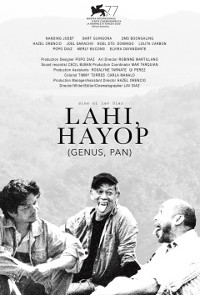 dir-scr-prd Lav Diaz with Don Melvin Boongaling, Nanding Josef, Bart Guingona, Joel Saracho, Hazel Orencio, Noel Sto Domingo, Popo Diaz, Lolita Carbon, Merly Bucong, Elvira Dayandante, Pipo de Leon, Danjoel Juan release UK 30.Oct.20 20/Philippines 2h37 VENICE FILM FEST  Is it streaming? |
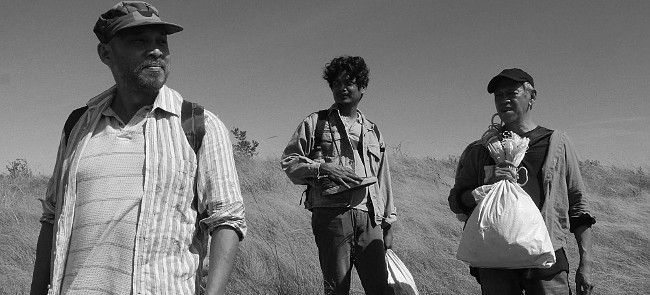 At two and a half hours, this is almost a short for Filipino auteur Lav Diaz. Shot in his usual silvery monochrome in extended busy takes, this is an insidiously vicious allegory about primal behaviour with a deliberately circuitous story structure. And it isn't particularly hopeful, either. So perhaps it's intentional that it's difficult to sympathise with characters who try but fail to be human to each other. Frustrated that most of their salaries go to paying off employers and loan sharks, gold mine workers have nothing left to send to their families. In between jobs, the exhausted Andres (Boongaling) travels to his home island Hugaw with two older colleagues: the tetchy Baldo (Josef) and the matter-of-fact Paulo (Guingona). They opt to approach home through a deserted jungle, rather than paying to use the port. But when Baldo insists on being the leader, Andres rebels against his extortion-style tactics. So Paulo tries to keep the peace. But even as they bond, tension is growing. The title refers to the genus of chimpanzees, as discussed in a radio programme about how some humans only use their brains at a chimp's level. Well-developed minds, the scientist argues, neither lie nor feel jealousy or anger, while those still at Pan level spew bigotry and violence. So as these three men travel across this island, a series of small incidents escalates to reveal the inner workings of their minds. And there's no justice when things take an even bleaker turn in the village ahead. The three lead actors embody their roles with attitude and physicality, often effectively heightened, especially when they're drunk. Andres mostly defers to his elders, but does so cynically. Baldo is terrified of local myths, blaming Andres for cursing them to a violent death. And Paulo is depressed to be a grown man reduced to working like an animal for a pittance. So when the plot suddenly leaps forward, or steps to the side, we become curious to fill in the gaps. And the big picture isn't rosy. Diaz shoots scenes in often unnervingly clever ways, using wide frames to put characters in context with each other and their environment. So the island's grisly history from the galleon trade to WWII plays into the story. And where this plot continues to go after the trio's momentous cross-island trek is even edgier, tapping into the kinds of feral impulses that are expressed by those who have elected and still support immoral politicians, which of course doesn't only happen in the Philippines.
| ||||||||||||
|
The Intruder El Prófugo Review by Rich Cline | 
BERLIN FILM FEST  Is it streaming?
| 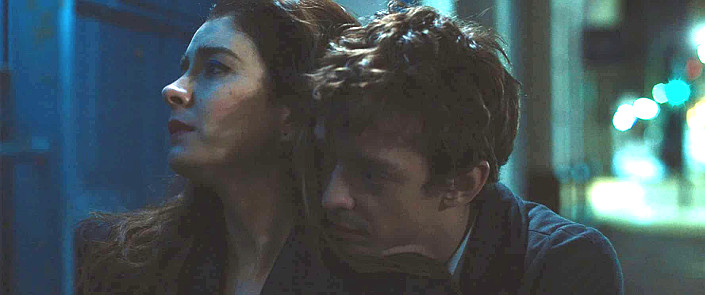 Inventively mixing real-life humour with some seriously unsettling horror, Argentine writer-director Natalie Meta boldly spins a bizarre story about a woman on the brink. It's not an easy film to stick with, as it continually wrongfoots the audience (and the central character) about what's actually happening here. But it's made with such a hypnotic tone that it's impossible to turn away, especially as things get progressively freakier. A voiceover artist who dubs pulpy movies into Spanish, Ines (Rivas) is crippled by fear before, during and after a holiday with her boyfriend Leopoldo (Hendler). It goes predictably wrong, and she returns home in a downward spiral. A visit from her diva mother Marta (Roth) doesn't help, but nice-guy organ tuner Alberto (Biscayart) is supportive. And now there's an "intruder" in her voice, a rogue noise sound technician Nelson (Rittano) hears through the mic. Doctors can't find anything, but a colleague (Busnelli) has a theory about how to confront it and send it away. Lush and colourful, the film is expertly shot by the terrific Barbara Alvarez, turning amazing locations into dreamscapes that reveal internal thoughts and feelings. And the sound mix is just as inventive, cleverly swirling Ines' harrowing work on horror films into her dream-tormented life. The script mixes her reality-blurring perspective with various normal-life experiences that add to the film's acute textures and make it even more haunting. Especially with some seriously unhinged jolts along the way. Rivas holds the film with a strikingly open-handed performance as a woman who is being worn down by the gyrations inside her mind. She's smart and funny, but constantly riddled with terror that she tries to compartmentalise, often looking like she's seen a ghost. Her attempts to isolate and rid herself of this intruder are intriguing and downright freaky. And her interaction with other characters bristles with a blend of warmth and wariness. The characters around her are rooted in earthier authenticity, although that's not how Ines sees them. Intriguingly, the films original Spanish title means "the fugitive", which gives the premise a rather different slant. There are times when Meta's dream-within-dreams approach loses the viewer, because it's tricky to remain engaged when the plot is this opaque. But we can't help but sympathise with Ines as her mind continues to slip, wondering along with her what's actually going on here. And as a depiction of a woman who learns to give in to her deeper yearnings, this is seriously audacious filmmaking.
| 
See also: SHADOWS FILM FESTIVAL © 2020 by Rich Cline, Shadows
on the Wall
HOME | REVIEWS | NEWS | FESTIVAL | AWARDS
| Q&A | ABOUT | TALKBACK | | ||||||||||

